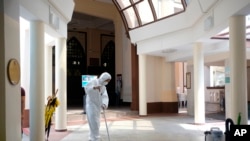Singapore is planning a record $39-billion stimulus package aimed at supporting the economy amid the financial impact of the coronavirus pandemic. It is bracing for a possible recession as the virus slows down economic activity.
Singapore will also take the unusual step of dipping into its state reserves to pay for stimulus spending that will cover wage support to businesses, cash aid to independent workers and other residents, grocery vouchers, and tax delays. Tapping reserves is a rare move in the island nation, one of the few in the world where the constitution requires the state to balance its official budget.
Singapore is among the first countries predicted to have negative economic growth due to the pandemic. News reports say Singapore has reported 74 new infections, bringing the current number of cases to 1,000 people. The Johns Hopkins University, which is tracking the outbreak, says three people to date have died in Singapore.
Earlier this week, the government allowed a weaker currency in order to facilitate exports and said it would spend 11% of gross domestic product to limit the economic harm caused by COVID-19. Singapore is considered a bellwether for the world economy because of its key trade role.
Its economy will contract by 1% to 4% this year, the Singaporean Ministry of Trade and Industry said last week Thursday. That was after already downgrading its economic forecast the previous month. It was based in part on figures showing the economy already contracted in the first quarter.
“In such extraordinary times, it is collective acts of kindness and courage that make a people extraordinary,” Heng Swee Keat, Singapore’s deputy prime minister and finance minister, told parliament in a speech announcing the latest aid. “How Singapore manages this, and whether we emerge stronger from this, will define us as a people and nation.”
He noted that Singapore has “an open economy that is highly integrated with the global economy” and “will be deeply impacted by these global shocks.” It has a small population of fewer than 6 million people, but a large number work in financial markets, oil trading, and shipping trade.
Industries in Singapore are closely connected with business in other nations and highly vulnerable to global economic shocks. The global economy grew 2.9% in 2019, according to the Organization for Economic Cooperation and Development, which forecasts that growth this year will be even lower, at 2.4%, because of COVID-19, the disease caused by the coronavirus.
“Experience suggests that about one-third of the economic losses from the disease will be direct costs, from loss of life, workplace closures, and quarantines,” Kristalina Georgieva, the managing director of the International Monetary Fund, said. “The remaining two-thirds will be indirect, reflecting a retrenchment in consumer confidence and business behavior and a tightening in financial markets.”
Those tightening markets will hit Singapore, which has been given AAA ratings by some credit rating agencies.
The nation was “already experiencing a slow pace of growth due to structural weaknesses even before the crisis unfolded,” economist Trinh Nguyen wrote in an analysis for the Carnegie Endowment for International Peace, a research institution.
Economic problems “will be more severe” now, she said, given Singapore’s exposure to China, where COVID-19 first broke out, for industries such as tourism, manufacturing, and retail.
Heng said his government will be spending money to support workers, at a cost of more than twice what it spent in support during the global financial crisis more than a decade ago.
“Unlike the global financial crisis or the Asian financial crisis, where both the causes and solutions were economic and financial in nature,” he said, “this crisis is far more complex with additional medical, social, and psychological dimensions.”




